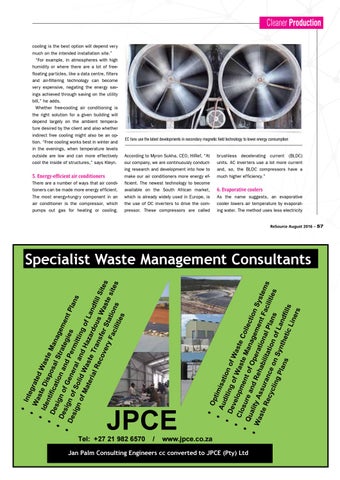Cleaner Production cooling is the best option will depend ver y much on the intended installation site.” “For example, in atmospheres with high humidity or where there are a lot of freefloating par ticles, like a data centre, filters and air-filtering technology can become ver y expensive, negating the energy savings achieved through saving on the utility bill,” he adds. Whether free-cooling air conditioning is the right solution for a given building will depend largely on the ambient temperature desired by the client and also whether indirect free cooling might also be an option. “Free cooling works best in winter and in the evenings, when temperature levels outside are low and can more effectively cool the inside of structures,” says Kleyn.
5. Energy-efficient air conditioners There are a number of ways that air conditioners can be made more energy efficient. The most energy-hungr y component in an air conditioner is the compressor, which pumps out gas for heating or cooling.
EC fans use the latest developments in secondary magnetic field technology to lower energy consumption
According to Myron Sukha, CEO, HiRef, “At our company, we are continuously conducting research and development into how to make our air conditioners more energy efficient. The newest technology to become available on the South African market, which is already widely used in Europe, is the use of DC inver ters to drive the compressor. These compressors are called
brushless decelerating current (BLDC) units. AC inver ters use a lot more current and, so, the BLDC compressors have a much higher efficiency.”
6. Evaporative coolers As the name suggests, an evaporative cooler lowers air temperature by evaporating water. The method uses less electricity ReSource August 2016 – 57
Specialist Waste Management Consultants
JPCE
Tel: +27 21 982 6570
/
www.jpce.co.za
Jan Palm Consulting Engineers cc converted to JPCE (Pty) Ltd
